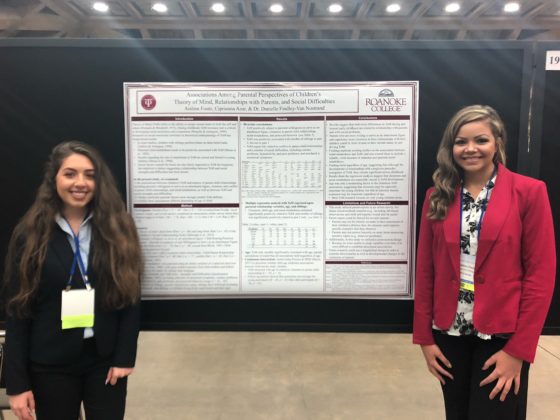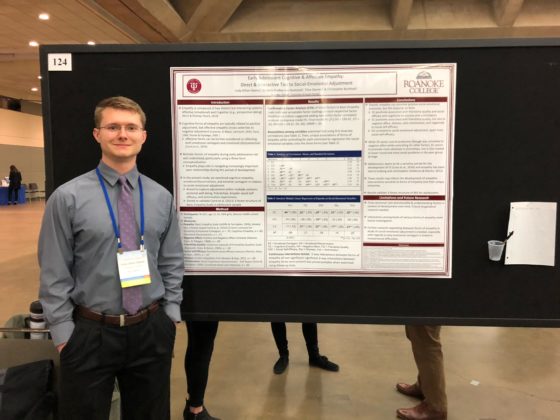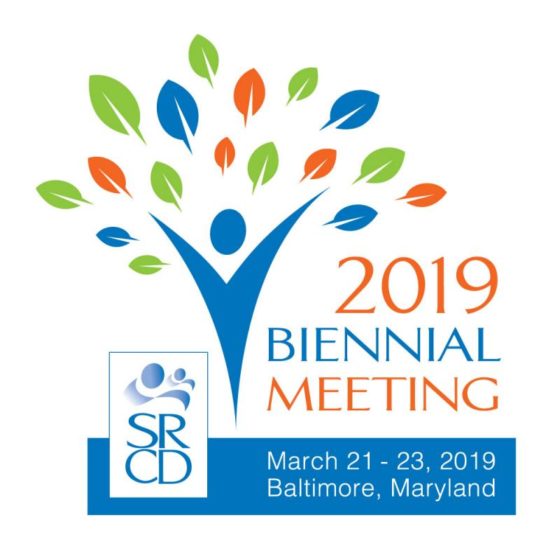Overview:
On March 21st through 23rd, Drs. Findley-Van Nostrand and Powell took seven students (including one alumnus) to the Society for Research in Child Development to present research through poster sessions, presentations, and a symposium. These students included Taylor Kracht ’18, Cody Dillon-Owens ’19, Aislinn Foutz ’19, Kiah Coflin ’19, Ciprianna Azar ’19, Rachel Harmon ’20, and Alaina Birkel, ’21.
Students and professors presented research through six different poster presentations, as well as one essay presentation that was part of a symposium. Dr. FVN and Dr. Powell presented one poster together, titled “Variations on a Lifespan Development Project Intended to Enhance Quality of Student Outcomes and Reflection of Reality.” Dr. Buchholz’s and Dr. FVN’s labs collaborated to present their work on “Early Adolescent Cognitive and Affective Empathy: Direct and Interactive Ties to Social-Emotional Adjustment.”
Descriptions of the presentations have been included below to learn more about the types of research the two labs are doing.
Dr. FVN’s and Dr. Powell’s research labs are presented separately. In this post, Dr. FVN’s Research Lab is the focus; Dr. Powell’s Research Lab will follow shortly.


Dr. FVN’s Research Lab
Dr. Findley-Van Nostrand:
I think the conference went really well. It was great to catch up with old friends and colleagues, and even better to get the students exposure to the work being conducted by SRCD members. It is a large and prestigious meeting, so they should be proud of their accomplishments. There were not many undergraduate students in attendance, let alone presenting their work! So very proud of all them from both labs being represented. I also appreciated that interactions with audience members and folks stopping by posters gave us several
good ideas for future research and even refinement of the research we presented. This was also my first time attending the SRCD Teaching Institute, which was a great opportunity. I left with good ideas and was able to share some of ours (mine and Dr. Powell’s) as well!
Cody Dillon-Owens:
At SRCD 2019 I had the amazing opportunity to present my lab’s research on how different forms of empathy can affect the social-emotional adjustment of adolescents. Being such a large conference, there were a vast number of symposiums to choose from that incorporated many other topics of interest besides developmental psychology. I had the chance to learn about new research ranging from community initiatives’ effects on adolescents’ political involvement, to how gut microbiota can affect our health across time, to how racial discrimination can affect children’s perceptions of the world. The conference was also a great time to network with other researchers and find out more about where our field is headed!
Symposium & Posters:
There were four posters and one symposium from Dr. FVN’s lab. Included in the poster session was a collaboration between Dr. Powell and Dr. FVN where they presented together on “a number of variations we have made to a cumulative assignment that is commonly used in Lifespan Development courses, all which aim to improve learning outcomes and interest from students.”
The symposium was titled “Circle Up: Using interpersonal theory and the interpersonal circumplex to study interpersonal relationships across development.” Dr. FVN and her colleague presented on “Social Goal Development during Middle School: Normative Changes and Prediction by Self-Esteem and Narcissism” as part of this symposium. This manuscript is in review for publication.
“My colleague and I presented research examining trajectories of social goals across early adolescence in the framework of the interpersonal circumplex model. Specifically, we discussed how agentic (striving for social status, respect, dominance) goals and communal (striving for closeness, friendship, affiliation) change across three time points, beginning to end of middle school. We also examined growth trajectories of combinations of these overarching goals. Finally, we examined how self-esteem and narcissism deferentially predict later goals. In short, narcissism predicts heightened agentic goal strivings, but primarily the social dominance (low communal) form of agency.”
Dr. Findley – Van Nostrand

There were three student posters from Dr. FVN’s lab. Aislinn Foutz and Ciprianna Azar presented a poster based on Aislinn’s Honors project, titled “Associations among Parental Perspectives of Children’s Theory of Mind, Relationships with Parents, and Social Difficulties.” The manuscript of this research is currently in preparation for publication. To learn more about Aislinn’s Honors research, click here. Aislinn also presented another poster at the conference with Dr. FVN, discussing research that they and Dr. Ojanen, Dr. FVN’s graduate school advisor, completed. This was titled “Early Adolescent Self-Concept Clarity: Negative Affect, Aggression, and Mediation by Self-Esteem.”
For the latter poster, Dr. FVN elaborates on the topic, saying: “Self-concept clarity refers to the degree to which an individuals’ self-concepts are clear and consistent to an individual. This construct has long been associated with positive emotional adjustment and behaviors in adults, but research on adolescents is limited. Research on youth in Dutch samples has established that self-concept clarity is related to lowered depression, and greater identity commitment, but this research has not concurrently assessed self-concept clarity and self-esteem and has not been extended to US samples. This study establishes self-concept clarity as a predictor of lowered negative affect, and this association is mediated by self-esteem. Further, when examining both self-concept clarity and self-esteem, self-concept clarity alone is related to lower levels of peer-group aggression.”
Dr. FVN also adds that: A manuscript reflecting a similar set of studies in young adults is presently in review for publication. This manuscript is in preparation for publication.

The final poster was presented by Cody Dillon-Owens on research conducted by himself, Dr. FVN, Dr. Buchholz, and Dr. Ojanen. The title of this work is: “Early Adolescent Cognitive and Affective Empathy: Direct and Interactive Ties to Social-Emotional Adjustment.”
In this study, we examined cognitive (e.g., perspective-taking) and affective (emotional) empathy in relation to a number of indices of social-emotional adjustment in a diverse sample of middle school students. These two forms of empathy show diverging relations with adjustment: whereas cognitive empathy seems to be almost universally good, emotional or affective empathy can sometimes elicit problems when experienced. Recent research in adults utilizing a common assessment of empathy, the Basic Empathy Scale, have found that this measure actually better reflects three sub-factors of empathy: cognitive empathy, emotional disconnection, and emotional contagion, the latter of which explaining some of the associations found between emotional empathy and social-emotional problems. We validated this three-factor structure of the Basic Empathy Scale in early adolescence, a period in which development of empathic understanding might be particularly important. Results suggest that emotional contagion is related problems like negative affect, victimization by peers, and low social self-efficacy, but to higher friendship quality, whereas cognitive empathy was related to positive social-emotional adjustment.
Dr. Findley – Van Nostrand
Dr. FVN also adds that this manuscript is in preparation to submit for publication.
Stay tuned for the next blog post, which will highlight Dr. Powell’s research lab at SRCD!
.
.
.
